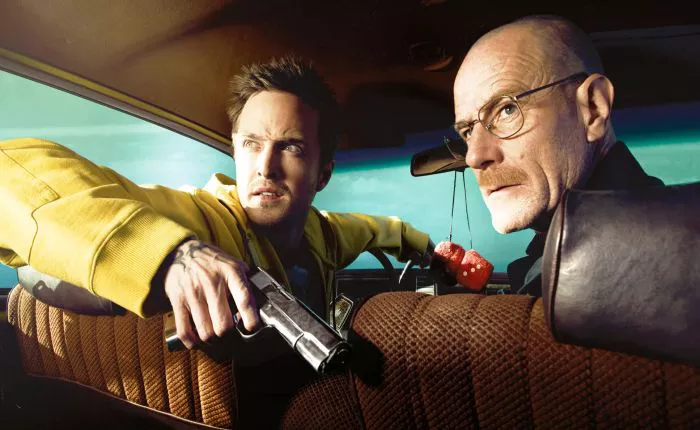“Breaking Bad” is a riveting television series that delves deep into the morally complex and transformative journey of its protagonist, Walter White. Created by Vince Gilligan, the show originally aired from 2008 to 2013 and quickly became a cultural phenomenon, captivating audiences with its gripping narrative, intense character development, and thematic depth. At its core, “Breaking Bad” is about the profound consequences of one man’s descent into the criminal underworld and the moral dilemmas that accompany his transformation.
The Premise
The series opens with Walter White, a high school chemistry teacher living in Albuquerque, New Mexico, facing a dire diagnosis: terminal lung cancer. Faced with the prospect of leaving his family in financial ruin, Walter decides to leverage his scientific expertise to cook and sell high-quality methamphetamine. Teaming up with his former student, Jesse Pinkman, Walter embarks on a dangerous journey into the illicit drug trade, adopting the alias “Heisenberg” to conceal his true identity.
Walter White’s Transformation
At the outset of “Breaking Bad,” Walter White is portrayed as a meek and downtrodden character, overshadowed by unfulfilled potential and financial hardship. However, as Walter delves deeper into the criminal underworld, his transformation is nothing short of remarkable. Fueled by a combination of desperation, hubris, and a thirst for power, Walter evolves from a sympathetic protagonist into a morally ambiguous anti-hero.
Themes of Morality and Consequences
“Breaking Bad” explores profound themes of morality, consequence, and the blurred lines between good and evil. As Walter White becomes increasingly entangled in criminal activities, he must grapple with the ethical implications of his choices. The series challenges viewers to confront uncomfortable truths about Walter’s actions and motivations, highlighting the moral complexities inherent in the human condition.
The Impact on Walter’s Family
Central to the narrative of “Breaking Bad” is the impact of Walter’s double life on his family, particularly his wife, Skyler, and son, Walter Jr. As Walter becomes more deeply involved in the drug trade, his relationships fracture under the weight of deception and danger. Skyler’s gradual realization of Walter’s criminal activities creates tension and conflict within their marriage, while Walter Jr. grapples with his father’s increasingly erratic behavior.
Jesse Pinkman’s Arc
Jesse Pinkman, portrayed by Aaron Paul, serves as a poignant counterpoint to Walter White’s trajectory. Initially introduced as Walter’s former student and business partner, Jesse undergoes his own tumultuous evolution throughout the series. Haunted by personal demons and struggling with addiction, Jesse becomes a tragic figure caught in Walter’s web of deception and violence.
The Antagonists: Gus Fring and Others
“Breaking Bad” introduces formidable antagonists who challenge Walter White’s ascent in the criminal underworld. Gus Fring, a calculating drug lord with a legitimate front as a fast-food restaurant owner, represents a significant threat to Walter’s operations. Other adversaries, including Tuco Salamanca, the Cousins, and Jack Welker, contribute to the series’ tension and suspense.
Cinematic Storytelling and Symbolism
Beyond its narrative complexities, “Breaking Bad” is celebrated for its cinematic storytelling and meticulous attention to detail. The series employs striking visuals, symbolism, and foreshadowing to enhance its storytelling. From iconic imagery like the pink teddy bear to the use of color symbolism and visual motifs, “Breaking Bad” invites viewers to interpret deeper layers of meaning within its narrative.
Legacy and Cultural Impact
“Breaking Bad” has left an indelible mark on popular culture, inspiring fervent fan communities, critical analysis, and spin-off content. The show’s legacy extends beyond its conclusion, with the prequel series “Better Call Saul” further exploring the universe and characters introduced in “Breaking Bad.”
Conlusion
In conclusion, “Breaking Bad” is a groundbreaking television series that deftly explores themes of morality, consequence, and transformation through the lens of its complex characters and gripping narrative. The show’s enduring impact and critical acclaim underscore its status as a modern classic and a testament to the power of storytelling in the Golden Age of television.
Related Topics:
Breaking Bad (TV Series 2008–2013) – A Comprehensive Overview
How ‘Breaking Bad’ Contributed to the Evolution of TV’s Golden Age
Awards and Nominations Received by Breaking Bad

